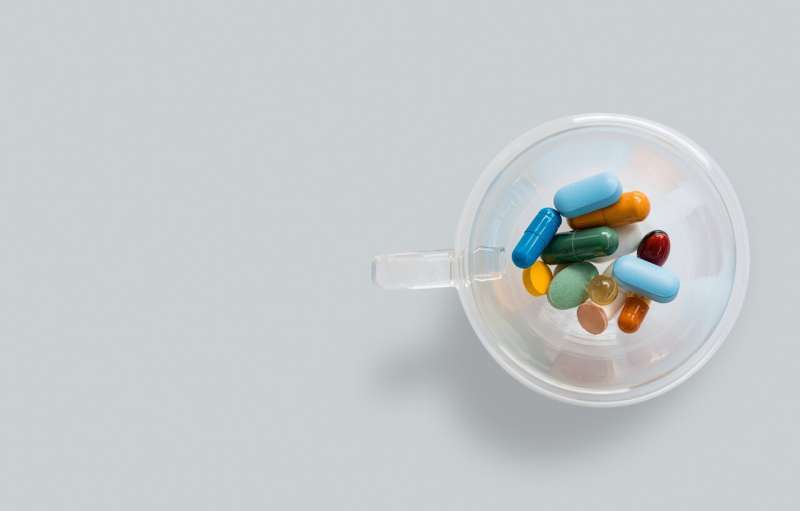This article has been reviewed according to Science X's editorial process and policies. Editors have highlighted the following attributes while ensuring the content's credibility:
fact-checked
peer-reviewed publication
trusted source
proofread
Antidepressants prescription associated with a lower risk of testing positive for COVID-19

New research led by the Institute of Psychiatry, Psychology & Neuroscience (IoPPN) at King's College London has found that community mental health patients who were prescribed antidepressants were significantly less likely to test positive for COVID-19 when admitted to inpatient care.
The research, published in BMC Medicine, suggests that antidepressants—particularly the most commonly prescribed class called selective serotonin reuptake inhibitors (SSRIs)—may have a preventative role against COVID-19 infection, and could provide a complementary approach to mass vaccination.
Using the Clinical Record Interactive Search (CRIS), a platform that enables researchers to investigate patient records without accessing personal data, researchers analyzed the clinical records of 5,664 patients admitted for mental health care at South London and Maudsley NHS Foundation Trust during the first wave of the COVID-19 pandemic (April to December 2020).
All newly admitted patients were mandatorily tested for COVID-19 and throughout their inpatient care. Out of the 5,664 patients, 202 patients tested positive. Researchers found that positive COVID-19 test results were about half as frequent in patients who recently had antidepressants mentioned on their medical record (90 days prior to admission), when compared to the patients with no such record. Further statistical analysis revealed that a recent prescription of antidepressants. was associated with an approximately 40 percent reduction in the likelihood of a positive COVID-19 test and SSRIs was the only class of antidepressants showing this association.
Dr. Oleg Glebov, a Lecturer at the Department of Old Age Psychiatry of King's IoPPN and lead author on the study, said, "Notwithstanding the success of vaccination against COVID-19, it has been of limited benefit to some people, particularly immunocompromised individuals and residents of lower-income economies. Our previous work shows that antidepressants may target the cell biology processes of COVID-19 infection, and the results of this study hint at the potential clinical benefit of this effect. In the longer term, cheap, well-characterized and readily available drugs such as antidepressants may help in curbing the spread of COVID-19. If our findings hold up in further investigation, it may provide some help for those left behind by the currently available strategies for COVID-19 prevention"
Due to the methods used and nature of SSRI treatment regimens, the researchers could not guarantee that all patients with a mention of antidepressants in their clinical records were taking the medication at the time of being tested. However, they believe that the association is strong enough to warrant further investigation in a wider population.
Professor Robert Stewart, Professor of Psychiatric Epidemiology & Clinical Informatics at King's IoPPN, and Deputy Theme lead for Informatics at the National Institute for Health and Care Research (NIHR) Maudsley Biomedical Research Centre said, "For over 15 years, the CRIS platform has been supporting novel and innovative research, allowing health services to learn from patients' anonymized records. The findings illustrate the huge potential value of this information, as this is the sort of question that could not have been feasibly investigated in any other way. Furthermore, networks like the HDRUK DATAMIND Hub are bringing together expertise, to ensure that the UK has international leadership in this sort of approach."
Professor Dag Aarsland, Professor of Old Age Psychiatry, King's College London, said, "This study provides further arguments that antidepressants have interesting effects beyond depression and anxiety. While the effects on COVID-19 are intriguing, we also plan to explore effects on other indications including brain diseases such as Alzheimer's disease."
More information: Oleg O. Glebov et al, Antidepressant drug prescription and incidence of COVID-19 in mental health outpatients: a retrospective cohort study, BMC Medicine (2023). DOI: 10.1186/s12916-023-02877-9





















